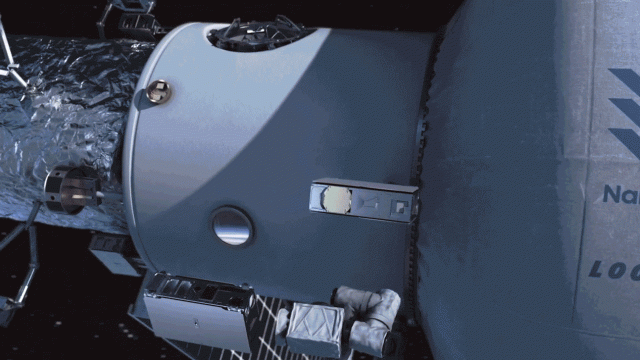Voyager Space announced a new collaboration with Hilton, the American hotel and hospitality company. Together, the companies are planning to bring crew lodging to Starlab, Voyager Space’s upcoming commercial space station which will be consistently crewed by four astronauts.
The road to space hospitality and tourism is paved with interesting approaches, like the balloon-powered space capsule that’s set to eventually cost a meager $US125,000 ($173,525) per flight. But one of Earth’s largest hospitality companies is looking to leave their mark on the private race to space. Hilton and Voyager Space have officially joined forces to collaborate on the upcoming Starlab, which is Voyager’s planned free-flying commercial space station, where Hilton plans to develop and design the crew lodging that will house Starlab personnel.
“For decades, discoveries in space have been positively impacting life on Earth, and now Hilton will have an opportunity to use this unique environment to improve the guest experience wherever people travel,” said Hilton President and CEO Chris Nassetta in a press release. “This landmark collaboration underscores our deep commitment to spreading the light and warmth of hospitality and providing a friendly, reliable stay – whether on the ground or in outer space,” Nassetta said.
As the International Space Station nears the end of its life, NASA is interested in making a shift toward privatised stations to fill the gap — and Starlab made the shortlist of potential contracts. Voyager Space, Nanoracks, and Lockheed Martin are all in partnership to bring Starlab to life, while other space stations in development include Blue Origins’ Orbital Reef, Axiom Space’s Axiom Station, and Northrop Grumman’s currently unnamed project. Even Vast Space, a startup from Southern California funded by cryptocurrency billionaire Jed McCaleb, wants to build an artificial gravity low-Earth orbit station.
Despite all of these promising projects, getting a space station up and running is no small task and very well could take longer than projected, which makes NASA concerned about its presence in low-Earth orbit as the ISS’s decommissioning in 2030 grows closer. More specifically NASA’s Office of Inspector General said in a 2021 report that NASA’s research on the human health effects of deep space travel, which relies on the microgravity environment offered by the ISS, will simply not be complete by 2030.
In addition to the private sector space stations looking to take up the ISS’s helm, Russia and China have expressed interest in state-owned stations. China’s Tiangong space station is currently in the midst of construction, with the first two modules, Tianhe and Wentian, having been successfully launched in April 2022 and July 2022, respectively. Roscosmos also announced their interest in a state-owned space station that could begin construction before Russia leaves the ISS after 2024.
More: Bezos’s ‘Orbital Reef’ Space Station Is Set to Be Hollywood’s Newest Star
